Charles E W Bean, Diaries, AWM38 3DRL 606/116/1 - June - September 1918 - Part 6
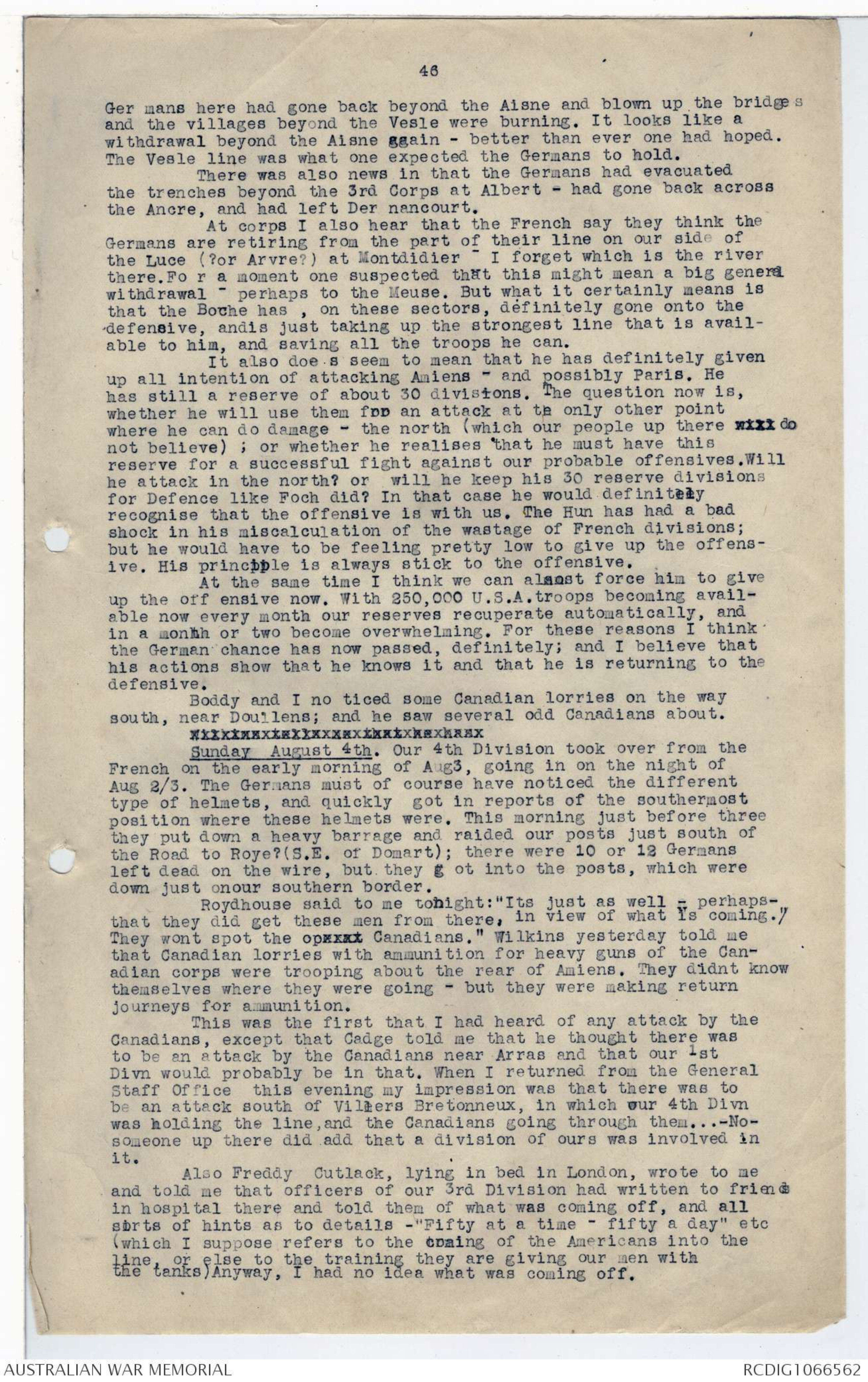
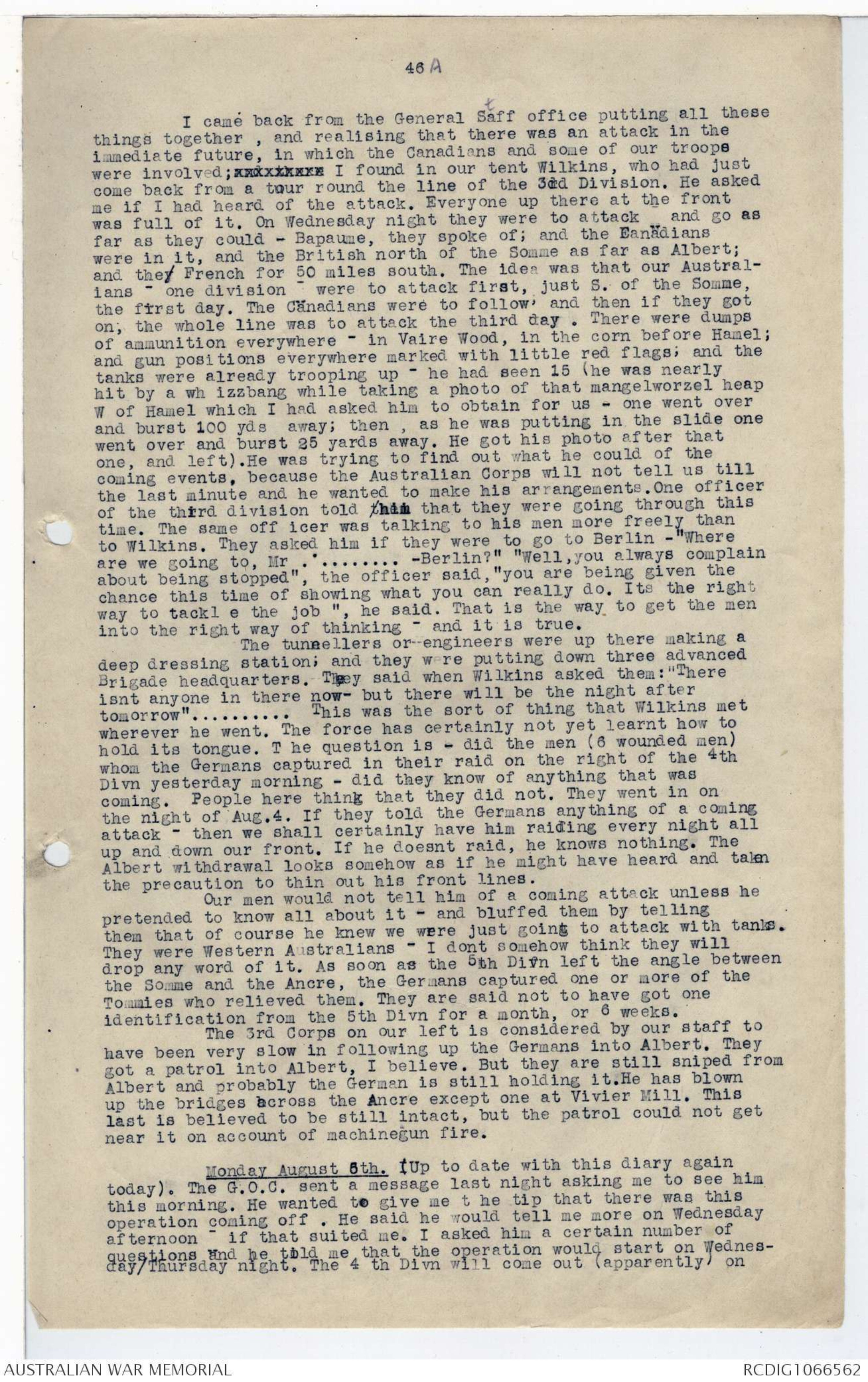
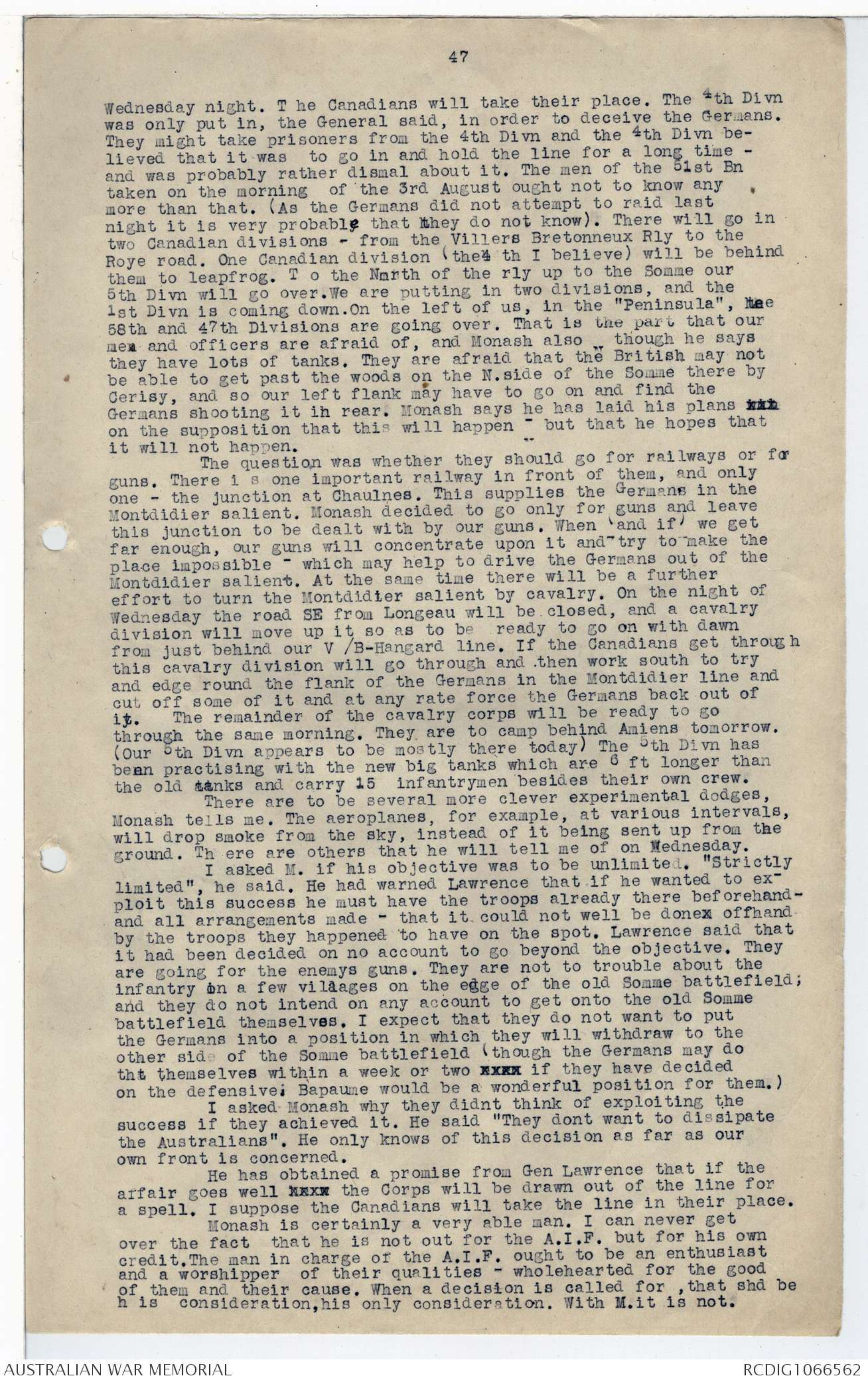
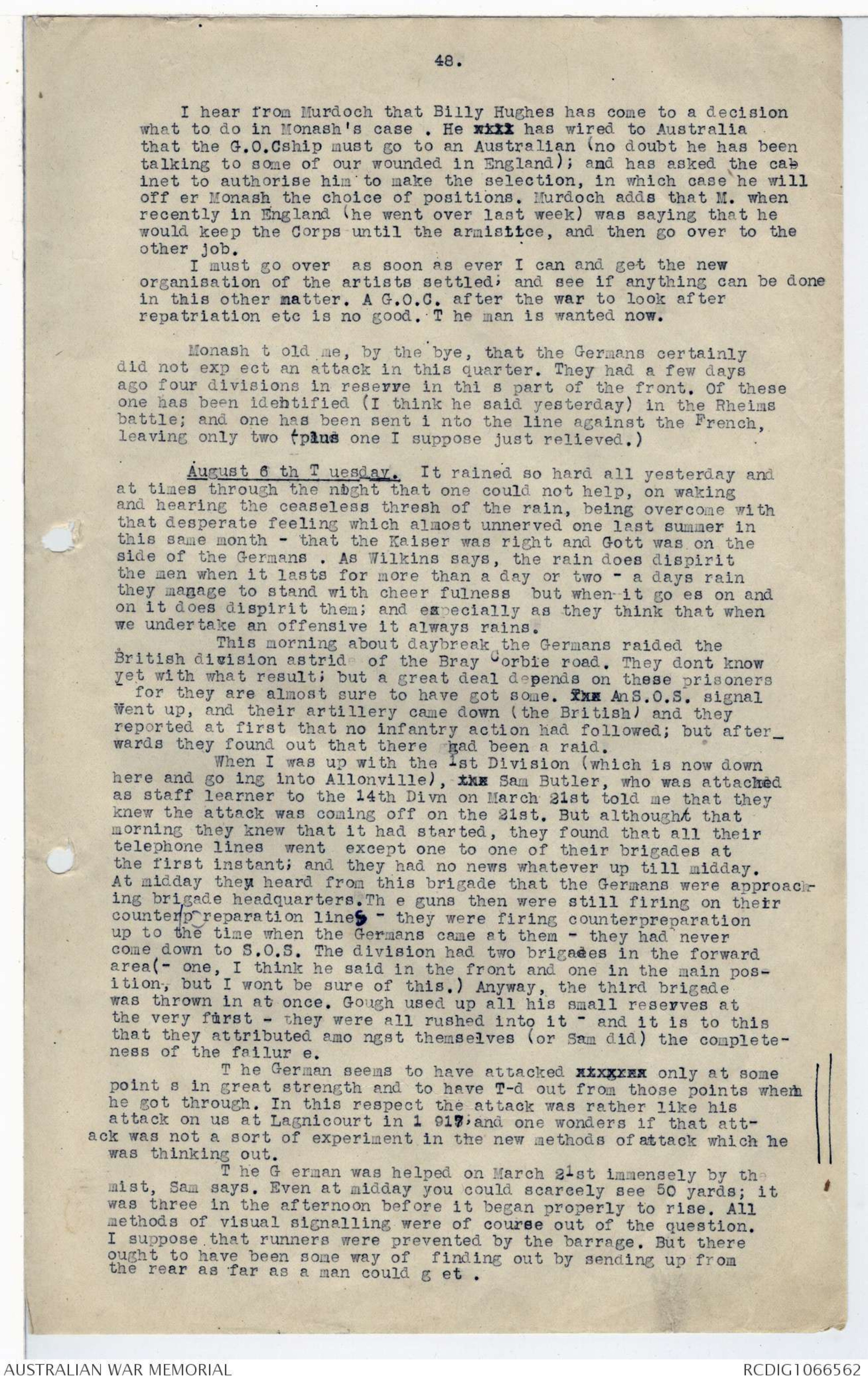
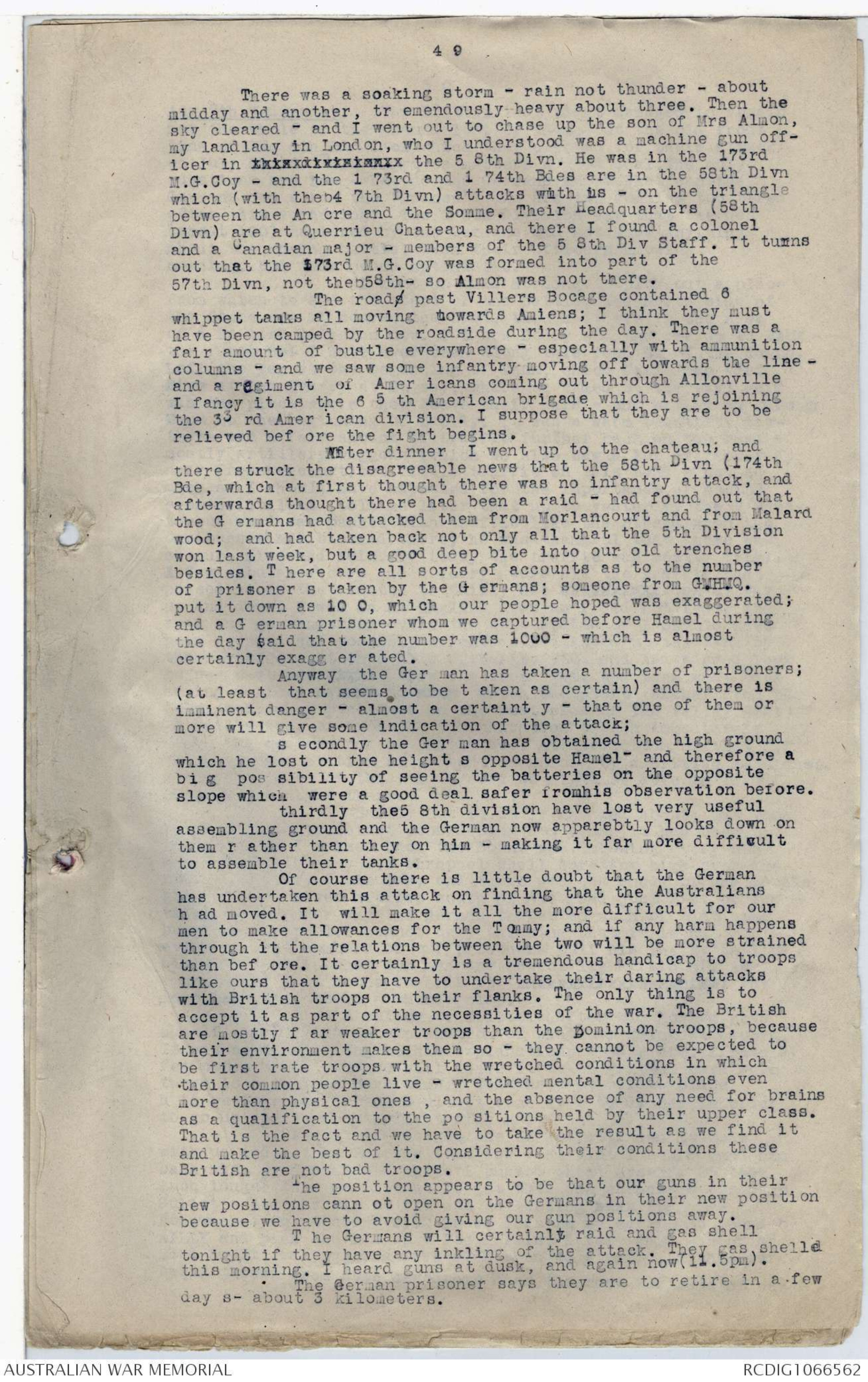
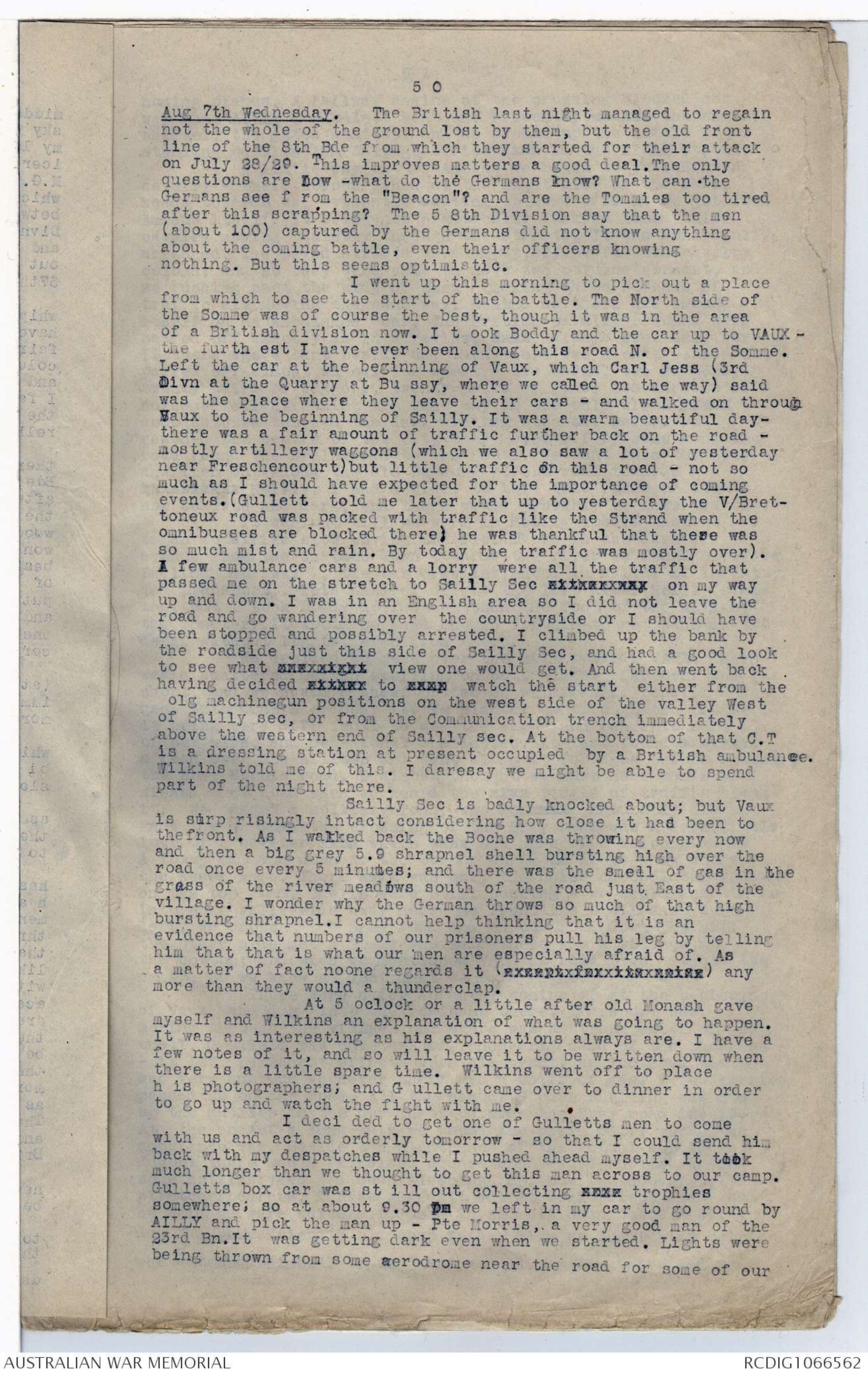
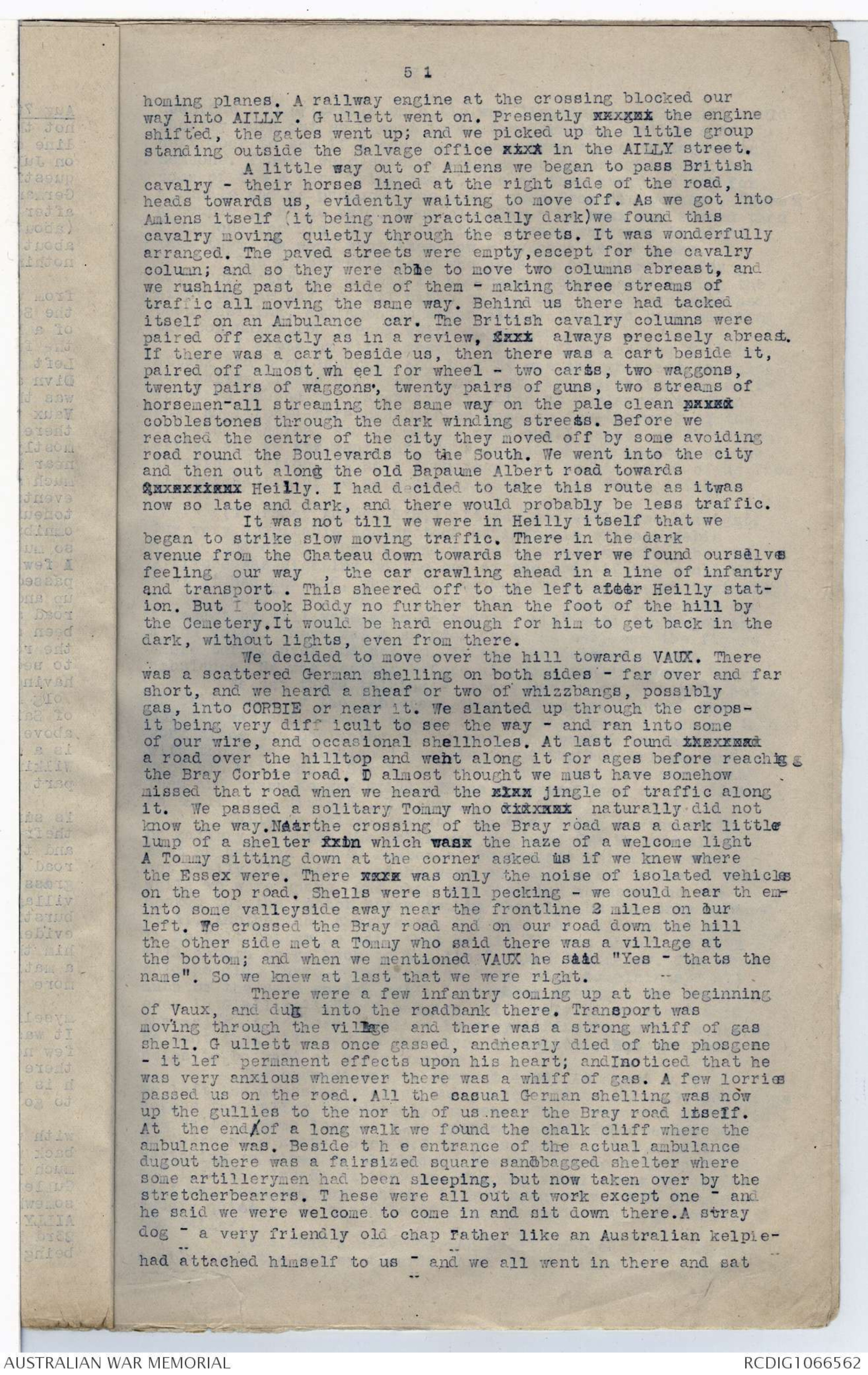
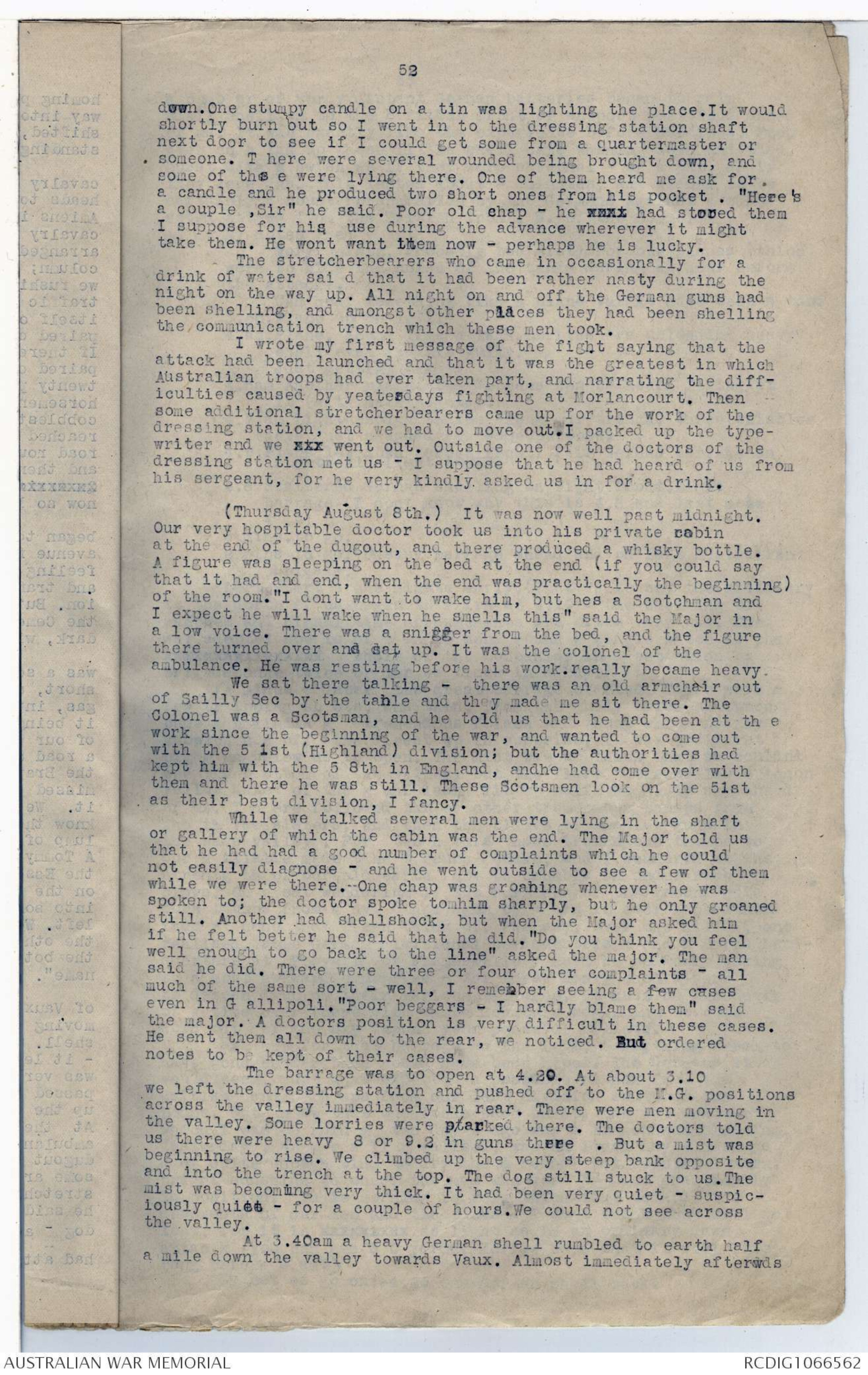
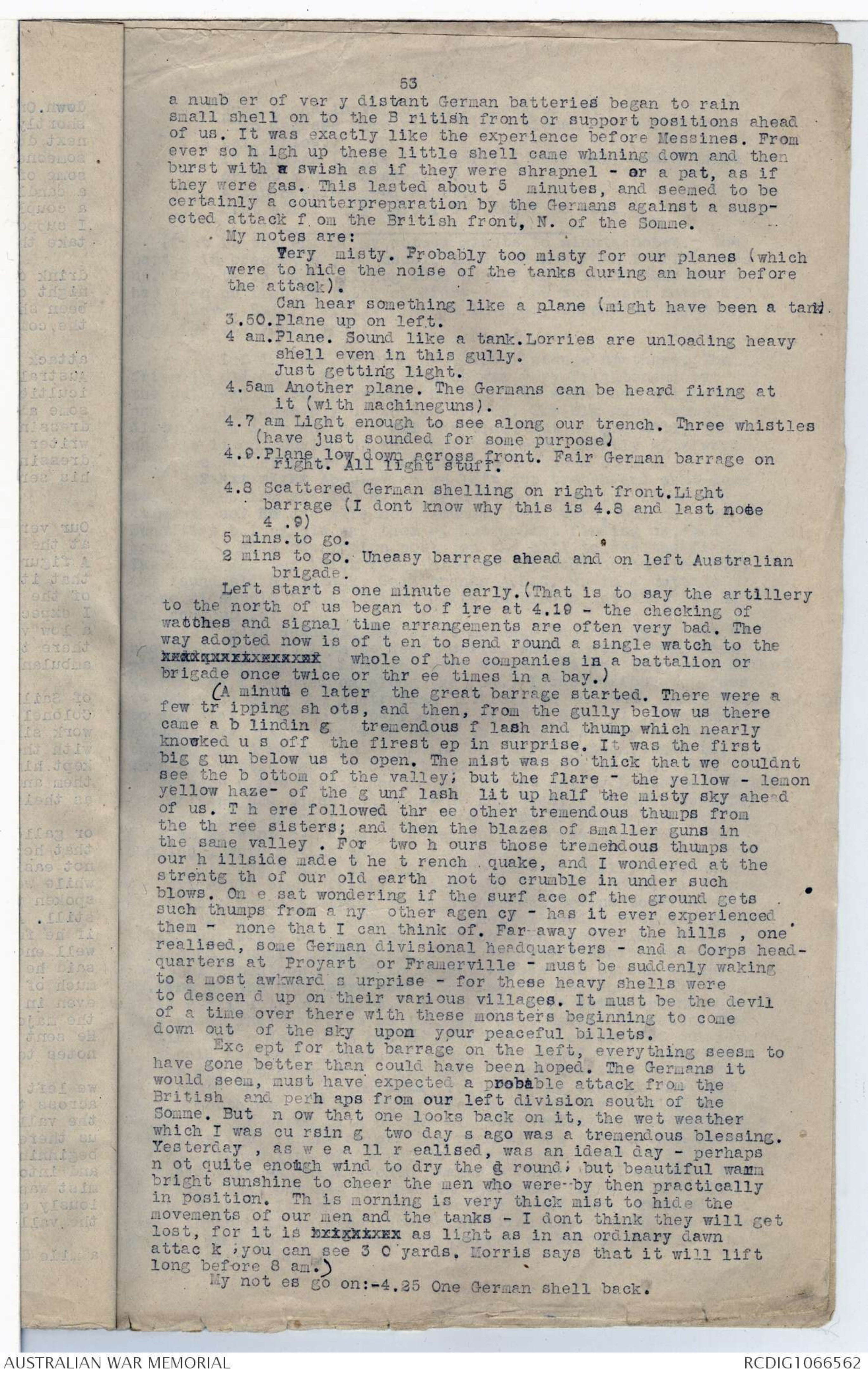
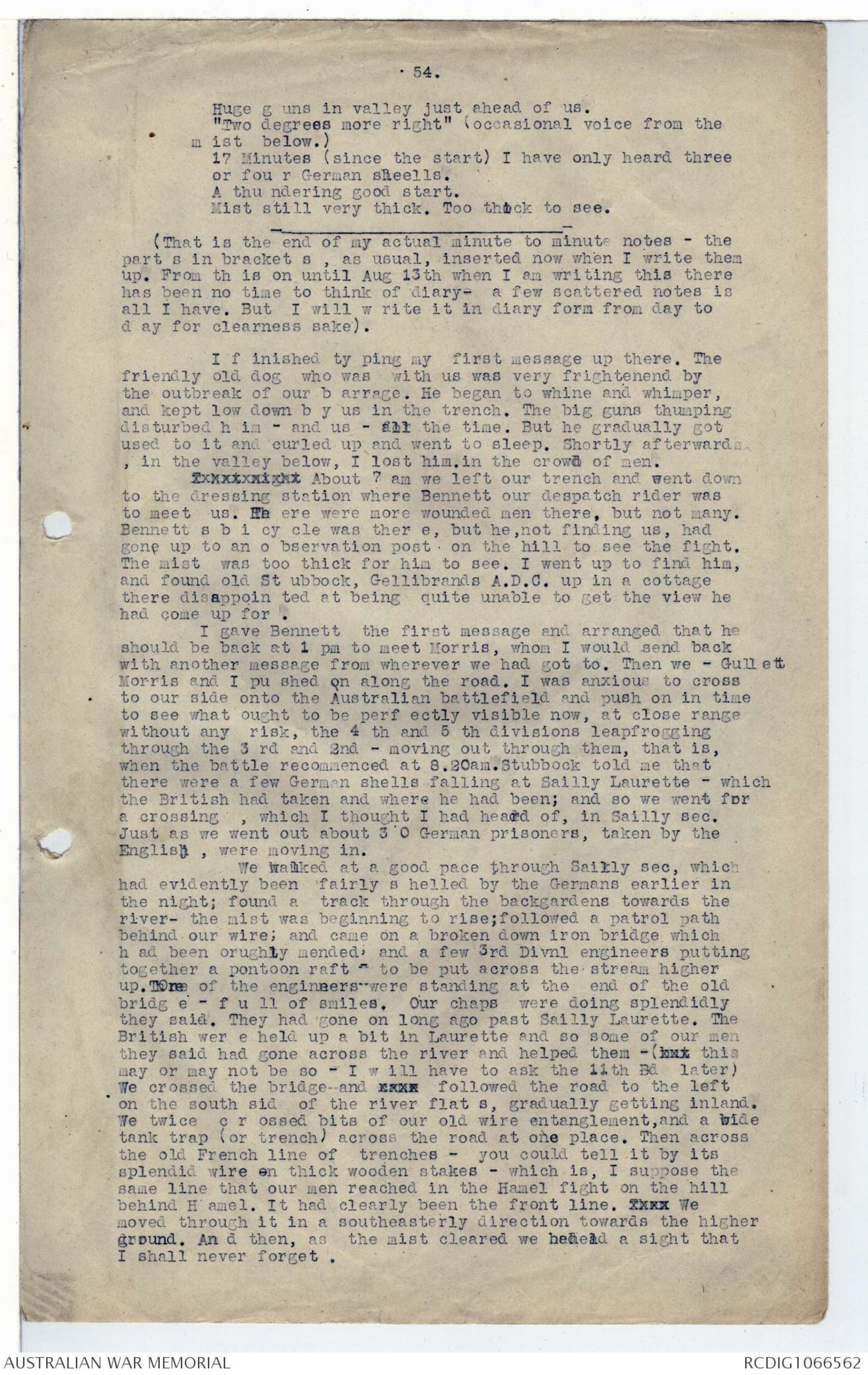
46
Ger mans here had gone back beyond the Aisne and blown up the bridges
and the villages beyond the Vesle were burning. It looks like a
withdrawal beyond the Aisne again - better than ever one had hoped.
The Vesle line was what one expected the Germans to hold.
There was also news in that the Germans had evacuated
the trenches beyond the 3rd Corps at Albert - had gone back across
the Ancre, and had left Der nancourt.
At corps I also hear that the French say they think the
Germans are retiring from the part of their line on our side of
the Luce (?or Arvre?) at Montdidier- I forget which is the river
there. F or a moment one suspected that this might mean a big general
withdrawal - perhaps to the Meuse. But what it certainly means is
that the Boche has, on these sectors, definitely gone onto the
defensive, andis just taking up the strongest line that is available
to him, and saving all the troops he can.
It also doe s seem to mean that he has definitely given
up all intention of attacking Amiens - and possibly Paris. He
has still a reserve of about 30 divisions. The question now is,
whether he will use them for an attack at te only other point
where he can do damage - the north (which our people up there xxxx do
not believe) ; or whether he realises that he must have this
reserve for a successful fight against our probable offensives. Will
he attack in the north? or will he keep his 30 reserve divisions
for Defence like Foch did? In that case he would definitely
recognise that the offensive is with us. The Hun has had a bad
shock in his miscalculation of the wastage of French divisions ;
but he would have to be feeling pretty low to give up the offensive.
His principle is always stick to the offensive.
At the same time I think we can almost force him to give
up the offensive now. With 250,000 U.S.A.troops becoming available
now every month our reserves recuperate automatically, and
in a month or two become overwhelming. For these reasons I think
the German chance has now passed, definitely; and I believe that
his actions show that he knows it and that he is returning to the
defensive.
Boddy and I no ticed some Canadian lorries on the way
south, near Douilens; and he saw several odd Canadians about.xxxxxxxxxxxxxxxxxxxxxxxxxxxxxxx
Sunday August 4th. Our 4th Division took over from the
French on the early morning of Aug 3, going in on the night of
Aug 2/3. The Germans must of course have noticed the different
type of helmets, and quickly, got in reports of the southermost
position where these helmets were. This morning just before three
they put down a heavy barrage and raided our posts just south of
the Road to Roye? (S.E. of Domart); there were 10 or 12 Germans
left dead on the wire, but they g ot into the posts, which were
down just onour southern border.
Roydhouse said to me tonight:"Its just as well - perhaps-
that they did get these men from there, in view of what is coming."
They wont spot the opxxxt Canadians." Wilkins yesterday told me
that Canadian lorries with ammunition for heavy guns of the Canadian
corps were trooping about the rear of Amiens. They didnt know
themselves where they were going - but they were making return
journeys for ammunition.
This was the first that I had heard of any attack by the
Canadians, except that Cadge told me that he thought there was
to be an attack by the Canadians near Arras and that our 1st
Divn would probably be in that. When I returned from the General
Staff Office this evening my impression was that there was to
be an attack south of Villers Bretonneux, in which our 4th Divn
was holding the line,and the Canadians going through them...-No-
someone up there did add that a division of ours was involved in
it.
Also Freddy Cutlack, lying in bed in London, wrote to me
and told me that officers of our 3rd Division had written to friend
in hospital there and told them of what was coming off, and all
sorts of hints as to details -"Fifty at a time - fifty a day" etc
(which I suppose refers to the coming of the Americans into the
line, or else to the training they are giving our men with
the tanks) Anyway, I had no idea what was coming off.
46 A
I came back from the General S^taff office putting all these
things together , and realising that there was an attack in the
immediate future, in which the Canadians and some of our troops
were involved;xxxxxxxxx I found in our tent Wilkins, who had just
come back from a tour round the line of the 3rd Division. He asked
me if I had heard of the attack. Everyone up there at the front
was full of it. On Wednesday night they were to attack and go as
far as they could - Bapaume, they spoke of; and the Canadians
were in it, and the British north of the Somme as far as Albert;
and they French for 50 miles south. The idea was that our Australians
- one division - were to attack first, just S. of the Somme,
the first day. The Canadians were to follow and then if they got
on, the whole line was to attack the third day . There were dumps
of ammunition everywhere - in Vaire Wood, in the corn before Hamel;
and gun positions everywhere marked with little red flags; and the
tanks were already trooping up - he had seen 15 (he was nearly
hit by a wh izzbang while taking a photo of that mangelworzel heap
W of Hamel which I had asked him to obtain for us - one went over
and burst 100 yds away; then , as he was putting in the slide one
went over and burst 25 yards away. He got his photo after that
one, and left). He was trying to find out what he could of the
coming events, because the Australian Corps will not tell us till
the last minute and he wanted to make his arrangements. One officer
of the third division told thim that they were going through this
time. The same off icer was talking to his men more freely than
to Wilkins. They asked him if they were to go to Berlin -"Where
are we going to, Mr .......... -Berlin?” "Well,you always complain
about being stopped", the officer said, "you are being given the
chance this time of showing what you can really do. Its the right
way to tackl e the job ", he said. That is the way to get the men
into the right way of thinking - and it is true.
The tunnellers or-engineers were up there making a
deep dressing station; and they were putting down three advanced
Brigade headquarters. They said when Wilkins asked them: "There
isnt anyone in there now- but there will be the night after
tomorrow".......... This was the sort of thing that Wilkins met
wherever he went. The force has certainly not yet learnt how to
hold its tongue. T he question is - did the men (6 wounded men)
whom the Germans captured in their raid on the right of the 4th
Divn yesterday morning - did they know of anything that was
coming. People here think that they did not. They went in on
the night of Aug.4. If they told the Germans anything of a coming
attack - then we shall certainly have him raiding every night all
up and down our front. If he doesnt raid, he knows nothing. The
Albert withdrawal looks somehow as if he might have heard and taken
the precaution to thin out his front lines.
Our men would not tell him of a coming attack unless he
pretended to know all about it - and bluffed them by telling
them that of course he knew we were just going to attack with tanks.
They were Western Australians - I dont somehow think they will
drop any word of it. As soon as the 5th Divn left the angle between
the Somme and the Ancre, the Germans captured one or more of the
Tommies who relieved them. They are said not to have got one
identification from the 5th Divn for a month, or 6 weeks.
The 3rd Corps on our left is considered by our staff to
have been very slow in following up the Germans into Albert. They
got a patrol into Albert, I believe. But they are still sniped from
Albert and probably the German is still holding it.He has blown
up the bridges across the Ancre except one at Vivier Mill. This
last is believed to be still intact, but the patrol could not get
near it on account of machinegun fire.
Monday August 5th. (Up to date with this diary again
today). The G.O.C. sent a message last night asking me to see him
this morning. He wanted to give me t he tip that there was this
operation coming off. He said he would tell me more on Wednesday
afternoon - if that suited me. I asked him a certain number of
questions and he told me that the operation would start on Wednesday/Thursday night.
The 4 th Divn will come out (apparently) on
47
Wednesday night. T he Canadians will take their place. The 4th Divn
was only put in, the General said, in order to deceive the Germans.
They might take prisoners from the 4th Divn and the 4th Divn believed
that it was to go in and hold the line for a long time -
and was probably rather dismal about it. The men of the 51st Bn
taken on the morning of the 3rd August ought not to know any
more than that. (As the Germans did not attempt to raid last
night it is very probable that they do not know). There will go in
two Canadian divisions - from the Villers Bretonneux Rly to the
Roye road. One Canadian division (the4 th I believe) will be behind
them to leapfrog. T o the North of the rly up to the Somme our
5th Divn will go over.We are putting in two divisions, and the
1st Divn is coming down.On the left of us, in the "Peninsula", xxe
58th and 47th Divisions are going over. That is the part that our
men and officers are afraid of, and Monash also, though he says
they have lots of tanks. They are afraid that the British may not
be able to get past the woods on the N.side of the Somme there by
Cerisy, and so our left flank may have to go on and find the
Germans shooting it in rear. Monash says he has laid his plans xxx
on the supposition that this will happen - but that he hopes that
it will not happen.
The question was whether they should go for railways or for
guns. There i s one important railway in front of them, and only
one - the junction at Chaulnes. This supplies the Germans in the
Montdidier salient. Monash decided to go only for guns and leave
this junction to be dealt with by our guns. When 'and if' we get
far enough, our guns will concentrate upon it and"try to make the
place impossible " which may help to drive the Germans out of the
Montdidier salient. At the same time there will be a further
effort to turn the Montdidier salient by cavalry. On the night of
Wednesday the road SE from Longeau will be closed, and a cavalry
division will move up it so as to be ready to go on with dawn
from just behind our V /B-Hangard line. If the Canadians get through
this cavalry division will go through and then work south to try
and edge round the flank of the Germans in the Montdidier line and
cut off some of it and at any rate force the Germans back out of
it. The remainder of the cavalry corps will be ready to go
through the same morning. They are to camp behind Amiens tomorrow.
(Our 5th Divn appears to be mostly there today) The 5th Divn has
been practising with the new big tanks which are 6 ft longer than
the old ttanks and carry 15 infantrymen besides their own crew.
There are to be several more clever experimental dodges,
Monash tells me. The aeroplanes, for example, at various intervals,
will drop smoke from the sky, instead of it being sent up from the
ground. Th ere are others that he will tell me of on Wednesday.
I asked M. if his objective was to be unlimited. "Strictly
limited", he said. He had warned Lawrence that if he wanted to exploit
this success he must have the troops already there beforehand-
and all arrangements made - that it could not well be donex offhand
by the troops they happened to have on the spot. Lawrence said that
it had been decided on no account to go beyond the objective. They
are going for the enemys guns. They are not to trouble about the
infantry in a few villages on the edge of the old Somme battlefield;
and they do not intend on any account to get onto the old Somme
battlefield themselves. I expect that they do not want to put
the Germans into a position in which they will withdraw to the
other side of the Somme battlefield (though the Germans may do
tht themselves within a week or two xxxx if they have decided
on the defensive; Bapaume would be a wonderful position for them.)
I asked Monash why they didnt think of exploiting the
success if they achieved it. He said "They dont want to dissipate
the Australians". He only knows of this decision as far as our
own front is concerned.
He has obtained a promise from Gen Lawrence that if the
affair goes well xxxx the Corps will be drawn out of the line for
a spell. I suppose the Canadians will take the line in their place.
Monash is certainly a very able man. I can never get
over the fact that he is not out for the A.I.F. but for his own
credit. The man in charge of the A.I.F. ought to be an enthusiast
and a worshipper of their qualities - wholehearted for the good
of them and their cause. When a decision is called for ,that shd be
h is consideration,his only consideration. With M.it is not.
48.
I hear from Murdoch that Billy Hughes has come to a decision
what to do in Monash's case . He xxxx has wired to Australia
that the G.O.Cship must go to an Australian (no doubt he has been
talking to some of our wounded in England); and has asked the cabinet
to authorise him to make the selection, in which case he will
off er Monash the choice of positions. Murdoch adds that M. when
recently in England (he went over last week) was saying that he
would keep the Corps until the armistice, and then go over to the
other job.
I must go over as soon as ever I can and get the new
organisation of the artists settled; and see if anything can be done
in this other matter. A G.O.C. after the war to look after
repatriation etc is no good. T he man is wanted now.
Monash t old me, by the bye, that the Germans certainly
did not exp ect an attack in this quarter. They had a few days
ago four divisions in reserve in thi s part of the front. Of these
one has been identified (I think he said yesterday) in the Rheims
battle; and one has been sent i nto the line against the French,
leaving only two (plus one I suppose just relieved.)
August 6 th T uesday. It rained so hard all yesterday and
at times through the night that one could not help, on waking
and hearing the ceaseless thresh of the rain, being overcome with
that desperate feeling which almost unnerved one last summer in
this same month - that the Kaiser was right and Gott was on the
side of the Germans . As Wilkins says, the rain does dispirit
the men when it lasts for more than a day or two - a days rain
they manage to stand with cheer fulness but when it go es on and
on it does dispirit them; and especially as they think that when
we undertake an offensive it always rains.
This morning about daybreak the Germans raided the
British division astride of the Bray Corbie road. They dont know
- yet with what result; but a great deal depends on these prisoners
for they are almost sure to have got some. Xxx An S.O.S. signal
Went up, and their artillery came down (the British) and they
reported at first that no infantry action had followed; but afterwards
they found out that there had been a raid.
When I was up with the 1st Division (which is now down
here and go ing into Allonville), xxx Sam Butler, who was attached
as staff learner to the 14th Divn on March 21st told me that they
knew the attack was coming off on the 21st. But althought that
morning they knew that it had started, they found that all their
telephone lines, went except one to one of their brigades at
the first instant; and they had no news whatever up till midday.
At midday they heard from this brigade that the Germans were approaching
brigade headquarters. T he guns then were still firing on their
counter/p reparation lines - they were firing counterpreparation
up to the time when the Germans came at them - they had never
come down to S.O.S. The division had two brigades in the forward
area(- one, I think he said in the front and one in the main position,
but I wont be sure of this.) Anyway, the third brigade
was thrown in at once. Gough used up all his small reserves at
the very first - they were all rushed into it - and it is to this
that they attributed amo ngst themselves (or Sam did) the completeness
of the failur e.
T he German seems to have attacked xxxxxxx only at some
point s in great strength and to have T-d out from those points when
he got through. In this respect the attack was rather like his
attack on us at Lagnicourt in 1 917:and one wonders if that attack
was not a sort of experiment in the new methods of attack which he
was thinking out.
T he G erman was helped on March 21st immensely by the
mist, Sam says. Even at midday you could scarcely see 50 yards; it
was three in the afternoon before it began properly to rise. All
methods of visual signalling were of course out of the question.
I suppose that runners were prevented by the barrage. But there
ought to have been some way of finding out by sending up from
the rear as far as a man could g et.
4 9
There was a soaking storm - rain not thunder - about
midday and another, tr emendously heavy about three. Then the
sky cleared - and I went out to chase up the son of Mrs Almon,
my landlady in London, who I understood was a machine gun officer
in xxxxxxxxxxxxxxx the 5 8th Divn. He was in the 173rd
M.G.Coy - and the 1 73rd and 1 74th Bdes are in the 58th Divn
which (with theb4 7th Divn) attacks with us - on the triangle
between the An cre and the Somme. Their Headquarters (58th
Divn) are at Querrieu Chateau, and there I found a colonel
and a Canadian major - members of the 5 8th Div Staff. It turns
out that the 173rd M.G.Coy was formed into part of the
57th Divn, not theb58th- so Almon was not there.
The roads past Villers Bocage contained 6
whippet tanks all moving towards Amiens; I think they must
have been camped by the roadside during the day. There was a
fair amount of bustle everywhere - especially with ammunition
columns - and we saw some infantry moving off towards the line -
and a regiment of Amer icans coming out through Allonville
I fancy it is the 6 5 th American brigade which is rejoining
the 33 rd Amer ican division. I suppose that they are to be
relieved bef ore the fight begins.
After dinner I went up to the chateau; and
there struck the disagreeable news that the 58th Divn (174th
Bde, which at first thought there was no infantry attack, and
afterwards thought there had been a raid - had found out that
the G ermans had attacked them from Morlancourt and from Malard
wood; and had taken back not only all that the 5th Division
won last week, but a good deep bite into our old trenches
besides. T here are all sorts of accounts as to the number
of prisoner s taken by the G ermans; someone from G.M.H.M.Q.
put it down as 10 0 , which our people hoped was exaggerated;
and a G erman prisoner whom we captured before Hamel during
the day said that the number was 1000 - which is almost
certainly exagg er ated.
Anyway, the Ger man has taken a number of prisoners;
(at least that seems to be t aken as certain) and there is
imminent danger - almost a certaint y - that one of them or
more will give some indication of the attack;
s econdly the Ger man has obtained the high ground
which he lost on the height s opposite Hamel- and therefore a
bi g pos sibility of seeing the batteries on the opposite
slope which were a good deal safer fromhis observation before.
thirdly the5 8th division have lost very useful
assembling ground and the German now apparebtly looks down on
them r ather than they on him - making it far more difficult
to assemble their tanks.
Of course there is little doubt that the German
has undertaken this attack on finding that the Australians
h ad moved. It will make it all the more difficult for our
men to make allowances for the Tommy; and if any harm happens
through it the relations between the two will be more strained
than bef ore. It certainly is a tremendous handicap to troops
like ours that they have to undertake their daring attacks
with British troops on their flanks. The only thing is to
accept it as part of the necessities of the war. The British
are mostly f ar weaker troops than the Dominion troops, because
their environment makes them so - they cannot be expected to
be first rate troops with the wretched conditions in which
their common people live - wretched mental conditions even
more than physical ones , and the absence of any need for brains
as a qualification to the po sitions held by their upper class.
That is the fact and we have to take the result as we find it
and make the best of it. Considering their conditions these
British are not bad troops.
The position appears to be that our guns in their
new positions cann ot open on the Germans in their new position
because we have to avoid giving our gun positions away.
T he Germans will certainly raid and gas shell
tonight if they have any inkling of the attack. They gas shelld
this morning. I heard guns at dusk, and again now (11.5pm).
The German prisoner says they are to retire in a few
day s- about 3 kilometers.
5 0
Aug 7th Wednesday. The British last night managed to regain
not the whole of the ground lost by them, but the old front
line of the 8th Bde from which they started for their attack
on July 28/29. This improves matters a good deal. The only
questions are now -what do the Germans know? What can the
Germans see f rom the "Beacon"? and are the Tommies too tired
after this scrapping? The 5 8th Division say that the men
(about 100) captured by the Germans did not know anything
about the coming battle, even their officers knowing
nothing. But this seems optimistic.
I went up this morning to pick out a place
from which to see the start of the battle. The North side of
the Somme was of course the best, though it was in the area
of a British division now. I t ook Boddy and the car up to VAUX-
the furth est I have ever been along this road N. of the Somme.
Left the car at the beginning of Vaux, which Carl Jess (3rd
Divn at the Quarry at Bu ssy, where we called on the way) said
was the place where they leave their cars - and walked on through
Vaux to the beginning of Sailly. It was a warm beautiful day-
there was a fair amount of traffic further back on the road -
mostly artillery waggons (which we also saw a lot of yesterday
near Freschencourt)but little traffic on this road - not so
much as I should have expected for the importance of coming
events. (Gullett told me later that up to yesterday the V/Brettoneux
road was packed with traffic like the Strand when the
omnibusses are blocked there) he was thankful that there was
so much mist and rain. By today the traffic was mostly over).
A few ambulance cars and a lorry, were all the traffic that
passed me on the stretch to Sailly Sec xxxxxxxxxx on my way
up and down. I was in an English area so I did not leave the
road and go wandering over the countryside or I should have
been stopped and possibly arrested. I climbed up the bank by
the roadside just this side of Sailly Sec, and had a good look
to see what xxxxxxxx view one would get. And then went back
having decided xxxxxx to xxxx watch the start, either from the
olg machinegun positions on the west side of the valley West
of Sailly sec, or from the Communication trench immediately
above the western end of Sailly sec. At the bottom of that C.T
is a dressing station at present occupied by a British ambulance.
Wilkins told me of this. I daresay we might be able to spend
part of the night there.
Sailly Sec is badly knocked about; but Vaux
is sur prisingly intact considering how close it had been to
the front. As I walked back the Boche was throwing every now
and then a big grey 5.9 shrapnel shell bursting high over the
road once every 5 minutes; and there was the smell of gas in the
grass of the river meadows south of the road just East of the
village. I wonder why the German throws so much of that high
bursting shrapnel.I cannot help thinking that it is an
evidence that numbers of our prisoners pull his leg by telling
him that that is what our men are especially afraid of. As
a matter of fact noone regards it (except for its noise) any
more than they would a thunderclap.
At 5 oclock or a little after old Monash gave
myself and Wilkins an explanation of what was going to happen.
It was as interesting as his explanations always are. I have a
few notes of it, and so will leave it to be written down when
there is a little spare time. Wilkins went off to place
h is photographers; and G ullett came over to dinner in order
to go up and watch the fight with me.
I decid ed to get one of Gulletts men to come
with us and act as orderly tomorrow - so that I could send him
back with my despatches while I pushed ahead myself. It took
much longer than we thought to get this man across to our camp.
Gulletts box car was st ill out collecting xxxx trophies
somewhere; so at about 9.30 pm we left in my car to go round by
AILLY and pick the man up - Pte Morris, a very good man of the
23rd Bn.It was getting dark even when we started. Lights were
being thrown from some aerodrome near the road for some of our
5 1
homing planes. A railway engine at the crossing blocked our
way into AILLY. G ullett went on. Presently xxxxxx the engine
shifted, the gates went up; and we picked up the little group
standing outside the Salvage office xxxx in the AILLY street.
A little way out of Amiens we began to pass British
cavalry - their horses lined at the right side of the road,
heads towards us, evidently waiting to move off. As we got into
Amiens itself (it being now practically dark)we found this
cavalry moving quietly through the streets. It was wonderfully
arranged. The paved streets were empty, escept for the cavalry
column; and so they were able to move two columns abreast, and
we rushing past the side of them - making three streams of
traffic all moving the same way. Behind us there had tacked
itself on an Ambulance car. The British cavalry columns were
paired off exactly as in a review, xxxx always precisely abreast.
If there was a cart beside us, then there was a cart beside it,
paired off almost, wh eel for wheel - two carts, two waggons,
twenty pairs of waggons; twenty pairs of guns, two streams of
horsemen-all streaming the same way on the pale clean xxxxx
cobblestones through the dark winding streets. Before we
reached the centre of the city they moved off by some avoiding
road round the Boulevards to the South. We went into the city
and then out along the old Bapaume Albert road towardsxxxxxxxxxx Heilly. I had decided to take this route as itwas
now so late and dark, and there would probably be less traffic.
It was not till we were in Heilly itself that we
began to strike slow moving traffic. There in the dark
avenue from the Chateau down towards the river we found ourselves
feeling our way , the car crawling ahead in a line of infantry
and transport. This sheered off to the left after Heilly station.
But I took Boddy no further than the foot of the hill by
the Cemetery. It would be hard enough for him to get back in the
dark, without lights, even from there.
We decided to move over the hill towards VAUX. There
was a scattered German shelling on both sides - far over and far
short, and we heard a sheaf or two of whizzbangs, possibly
gas, into CORBIE or near it. We slanted up through the crops-
it being very diff icult to see the way - and ran into some
of our wire, and occasional shellholes. At last found xxxxxxxx
a road over the hilltop and went along it for ages before reachigg
the Bray Corbie road. I almost thought we must have somehow
missed that road when we heard the xxxx jingle of traffic along
it. We passed a solitary Tommy who xxxxxxx naturally did not
know the way. Nearthe crossing of the Bray road was a dark little
lump of a shelter xxxx which wasx the haze of a welcome light
A Tommy sitting down at the corner asked us if we knew where
the Essex were. There xxxx was only the noise of isolated vehicles
on the top road. Shells were still pecking - we could hear th em-
into some valleyside away near the frontline 2 miles on our
left. We crossed the Bray road and on our road down the hill
the other side met a Tommy who said there was a village at
the bottom; and when we mentioned VAUX he said "Yes - thats the
name". So we knew at last that we were right.
There were a few infantry coming up at the beginning
of Vaux, and dug into the roadbank there. Transport was
moving through the village, and there was a strong whiff of gas
shell. G ullett was once gassed, andnearly died of the phosgene
- it lef permanent effects upon his heart; andInoticed that he
was very anxious whenever there was a whiff of gas. A few lorries
passed us on the road. All the casual German shelling was now
up the gullies to the nor th of us near the Bray road itself.
At the end/of a long walk we found the chalk cliff where the
ambulance was. Beside t h e entrance of the actual ambulance
dugout there was a fairsized square sandbagged shelter where
some artillerymen had been sleeping, but now taken over by the
stretcherbearers. T hese were all out at work except one - and
he said we were welcome to come in and sit down there.A stray
dog - a very friendly old chap rather like an Australian kelpie-
had attached himself to us - and we all went in there and sat
52
down.One stumpy candle on a tin was lighting the place. It would
shortly burn out so I went in to the dressing station shaft
next door to see if I could get some from a quartermaster or
someone. T here were several wounded being brought down, and
some of thos e were lying there. One of them heard me ask for
a candle and he produced two short ones from his pocket. "Here's
a couple ,Sir" he said. Poor old chap - he xxxx had stored them
I suppose for his use during the advance wherever it might
take them. He wont want them now - perhaps he is lucky.
The stretcherbearers who came in occasionally for a
drink of water sai d that it had been rather nasty during the
night on the way up. All night on and off the German guns had
been shelling, and amongst other places they had been shelling
the communication trench which these men took.
I wrote my first message of the fight saying that the
attack had been launched and that it was the greatest in which
Australian troops had ever taken part, and narrating the difficulties
caused by yeaterdays fighting at Morlancourt. Then
some additional stretcherbearers came up for the work of the
dressing station, and we had to move out.I packed up the typewriter
and we xxx went out. Outside one of the doctors of the
dressing station met us - I suppose that he had heard of us from
his sergeant, for he very kindly asked us in for a drink.
(Thursday August 8th.) It was now well past midnight.
Our very hospitable doctor took us into his private cabin
at the end of the dugout, and there produced a whisky bottle.
A figure was sleeping on the bed at the end (if you could say
that it had and end, when the end was practically the beginning)
of the room. "I dont want to wake him, but hes a Scotchman and
I expect he will wake when he smells this" said the Major in
a low voice. There was a snigger from the bed, and the figure
there turned over and sat up. It was the colonel of the
ambulance. He was resting before his work.really became heavy
We sat there talking - there was an old armchair out
of Sailly Sec by the table and they made me sit there. The
Colonel was a Scotsman, and he told us that he had been at th e
work since the beginning of the war, and wanted to come out
with the 5 1st (Highland) division; but the authorities had
kept him with the 5 8th in England, andhe had come over with
them and there he was still. These Scotsmen look on the 51st
as their best division, I fancy.
While we talked several men were lying in the shaft
or gallery of which the cabin was the end. The Major told us
that he had had a good number of complaints which he could
not easily diagnose - and he went outside to see a few of them
while we were there. One chap was groaning whenever he was
spoken to; the doctor spoke tomhim sharply, but he only groaned
still. Another had shellshock, but when the Major asked him
if he felt better he said that he did."Do you think you feel
well enough to go back to the line" asked the major. The man
said he did. There were three or four other complaints - all
much of the same sort - well, I remember seeing a few cases
even in G allipoli. "Poor beggars - I hardly blame them" said
the major. A doctors position is very difficult in these cases.
He sent them all down to the rear, we noticed. But ordered
notes to be kept of their cases.
The barrage was to open at 4.20. At about 3.10
we left the dressing station and pushed off to the M.G. positions
across the valley immediately in rear. There were men moving in
the valley. Some lorries were ptarked there. The doctors told
us there were heavy, 8 or 9.2 in guns there. But a mist was
beginning to rise. We climbed up the very steep bank opposite
and into the trench at the top. The dog still stuck to us. The
mist was becoming very thick. It had been very quiet - suspiciously
quiet - for a couple of hours. We could not see across
the valley.
At 3.40am a heavy German shell rumbled to earth half
a mile down the valley towards Vaux. Almost immediately afterwds
53
a num ber of ver y distant German batteries began to rain
small shell on to the B ritish front or support positions ahead
of us. It was exactly like the experience before Messines. From
ever so h igh up these little shell came whining down and then
burst with x swish as if they were shrapnel - or a pat, as if
they were gas. This lasted about 5 minutes, and seemed to be
certainly a counterpreparation by the Germans against a suspected
attack f om the British front, N. of the Somme.
My notes are:
Very misty. Probably too misty for our planes (which
were to hide the noise of the tanks during an hour before
the attack).
Can hear something like a plane (might have been a tank)
3.50.Plane up on left.
4 am.Plane. Sound like a tank.Lorries are unloading heavy
shell even in this gully.
Just getting light.
4.5am Another plane. The Germans can be heard firing at
it (with machineguns).
4.7 am Light enough to see along our trench. Three whistles
(have just sounded for some purpose)
4.9.Plane low down across front. Fair German barrage on
right. All light stuff.
4.8 Scattered German shelling on right front.Light
barrage (I dont know why this is 4.8 and last note
4 .9)
5 mins.to go.
2 mins to go. Uneasy barrage ahead and on left Australian
brigade.
Left start s one minute early. (That is to say the artillery
to the north of us began to f ire at 4.19 - the checking of
watches and signal time arrangements are often very bad. The
way adopted now is of t en to send round a single watch to thexxxxxxxxxxxxxxxx whole of the companies in a battalion or
brigade once twice of thr ee times in a bay.)
(A minute later the great barrage started; There were a
few tr ipping sh ots, and then, from the gully below us there
came a b lindin g tremendous f lash and thump which nearly
knocked u s off the firest ep in surprise. It was the first
big g un below us to open. The mist was so thick that we couldnt
see the b ottom of the valley; but the flare - the yellow - lemon
yellow haze- of the g unf lash lit up half the misty sky ahead
of us. T h ere followed thr ee other tremendous thumps from
the th ree sisters; and then the blazes of smaller guns in
the same valley . For two h ours those tremendous thumps to
our h illside made t he t rench quake, and I wondered at the
strentg th of our old earth not to crumble in under such
blows. On e sat wondering if the surf ace of the ground gets
such thumps from a ny other agen cy - has it ever experienced
them - none that I can think of. Far away over the hills , one
realised, some German divisional headquarters - and a Corps headquarters
at Proyart or Framerville - must be suddenly waking
to a most awkward s urprise - for these heavy shells were
to descen d up on their various villages. It must be the devil
of a time over there with these monsters beginning to come
down out of the sky upon your peaceful billets.
Exc ept for that barrage on the left, everything seesm to
have gone better than could have been hoped. The Germans it
would seem, must have expected a probable attack from the
British and perh aps from our left division south of the
Somme. But n ow that one looks back on it, the wet weather
which I was cu rsin g two day s ago was a tremendous blessing.
Yesterday , as w e a ll r ealised, was an ideal day - perhaps
n ot quite enough wind to dry the g round; but beautiful warm
bright sunshine to cheer the men who were by then practically
in position. Th is morning is very thick mist to hide the
movements of our men and the tanks - I dont think they will get
lost, for it is xxxxxxxxxx as light as in an ordinary dawn
attac k, you can see 3 0 yards. Morris says that it will lift
long before 8 am.)
My not es go on: -4.25 One German shell back.
54.
Huge g uns in valley just ahead of us.
"Two degrees more right" (occasional voice from the
m ist below.)
17 Minutes (since the start) I have only heard three
or fou r German sheells.
A thu ndering good start.
Mist still very thick. Too thick to see.
(That is the end of my actual minute to minute notes - the
part s in bracket s, as usual, inserted now when I write them
up. From th is on until Aug 13th when I am writing this there
has been no time to think of diary- a few scattered notes is
all I have. But I will w rite it in diary form from day to
d ay for clearness sake).
I f inished ty ping my first message up there. The
friendly old dog who was with us was very frightenend by
the outbreak of our b arrage. He began to whine and whimper,
and kept low down b y us in the trench. The big guns thumping
disturbed h im - and us -all the time. But he gradually got
used to it and curled up and went to sleep. Shortly afterwards
, in the valley below, I lost him,in the crowd of men.
xxxxxxxxxxx About 7 am we left our trench and went down
to the dressing station where Bennett our despatch rider was
to meet us. Th ere were more wounded men there, but not many.
Bennett s b i cy cle was ther e, but he ,not finding us, had
gone up to an o bservation post on the hill to see the fight.
The mist was too thick for him to see. I went up to find him,
and found old St ubbock, Gellibrands A.D.C. up in a cottage
there disappoin ted at being quite unable to get the view he
had come up for .
I gave Bennett the first message and arranged that he
should be back at 1 pm to meet Morris, whom I would send back
with another message from wherever we had got to. Then we - Gullett
Morris and I pu shed on along the road. I was anxious to cross
to our side onto the Australian battlefield and push on in time
to see what ought to be perf ectly visible now, at close range
without any risk, the 4 th and 5 th divisions leapfrogging
through the 3 rd and 2nd - moving out through them, that is
when the battle recommenced at 8.20am.Stubbock told me that
there were a few German shells falling at Sailly Laurette - which
the British had taken and where he had been; and so we went for
a crossing , which I thought I had heard of, in Sailly sec.
Just as we went out about 3 0 German prisoners, taken by the
English , were moving in.
We walked at a good pace through Sailly sec, which
had evidently been fairly s helled by the Germans earlier in
the night; found a track through the backgardens towards the
river- the mist was beginning to rise;followed a patrol path
behind our wire; and came on a broken down iron bridge which
h ad been orughly mended: and a few 3rd Divnl engineers putting
together a pontoon raft to be put across the stream higher
up.Three of the engineers were standing at the end of the old
bridg e - f u ll of smiles. Our chaps were doing splendidly
they said. They had gone on long ago past Sailly Laurette. The
British wer e held up a bit in Laurette and so some of our men
they said had gone across the river and helped them - (xxx this
may or may not be so - I w ill have to ask the 11th Bd later)
We crossed the bridge-and xxxx followed the road to the left
on the south sid of the river flat s, gradually getting inland.
We twice, cr ossed bits of our old wire entanglement, and a wide
tank trap (or trench) across the road at one place. Then across
the old French line of trenches - you could tell it by its
splendid wire on thick wooden stakes - which is, I suppose the
same line that our men reached in the Hamel fight on the hill
behind H amel. It had clearly been the front line. Xxxx We
moved through it in a southeasterly direction towards the higher
ground. An d then, as the mist cleared we beheld a sight that
I shall never forget .
 Deb Parkinson
Deb ParkinsonThis transcription item is now locked to you for editing. To release the lock either Save your changes or Cancel.
This lock will be automatically released after 60 minutes of inactivity.